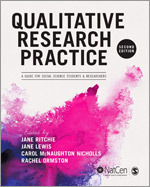Qualitative Research Practice
A Guide for Social Science Students and Researchers
- Jane Ritchie - National Centre for Social Research, London
- Jane Lewis - Colebrooke Centre for Evidence and Implementation
- Carol McNaughton Nicholls - National Centre for Social Research, London
- Rachel Ormston - Scottish Centre for Social Research
Qualitative Research (General) | Social Research Methods | Sociological Research Methods
Written by a team of leading researchers associated with NatCen Social Research (the National Centre for Social Research) this textbook leads students and researchers through the entire process of qualitative research from beginning to end - moving through design, sampling, data collection, analysis and reporting. In this fully revised second edition you will find:
- A practical account of how to carry out qualitative research which recognises a range of current approaches and applications
- A brand new chapter on ethics
- A brand new chapter on observational research
- Updated advice on using software when analysing your qualitative data
- New case studies which illustrate issues you may encounter and how problems have been tackled by other researchers.
A very valuable and interesting text which outlines the essential issues associated with qualitative research practice. This text gives a step-by-step guide to the budding researcher and it highlights some of the pertinent issues which may be forgotten or overlooked. It also serves as a very good resource for novice or experienced researchers alike. I will definitely recommend this to my students.
A clear and considered text which offers practical support for students undertaking their research projects. The layout and design of the chapters makes this book very readable.
We can but advocate the book to students but since most of our masters students and indeed DMin students work on empirical research they should get this!
Many text books explain quantitative research methods and some detail qualitative methods, however rarely are the research practices given the same degree of detail. This book will prove to be an excellent resource for any student undertaking a dissertation, regardless of their discipline. The rationale for and the stages of designing and delivering on qualitative research are clearly and succinctly laid out in the pages of this book.
A useful resource for students on the research methods module. It will also be a useful resource for those students enaging in qualitative research for their dissertations
This is a great book! I am planning on adopting some chapters from "Qualitative Research Practice" in a post-graduate module that introduces students to contemporary issues in media and communication with a strong link to a variety of research methods. While I won't have time to fully consider the first chapter (Foundations of Qualitative Research), Iwill recommend this chapter as further reading. The second chapter, however, (Applications) is extremely useful, especially the section on mixing methods, which will be an essential reading for one of the lectures. As the students will be asked to prepare and discuss a research proposal, chapters 3 (Design Issues), 4 (Ethics) and 5 (Samples) will all be essential readings. Depending on what research method the students choose, they will be asked to read chapters 7 (In-depth interviews), 8 (Focus Groups), or 9 (Observation) respectively. The latter chapters (Analysis etc.) are not relevant to students in this module as they won't actually conduct research. However, these chapters will be relevant to those students who wish to do their MA dissertation using qualitative methods.
All in all, the design of this book is well thought through and gives researchers and students a good guide of how to conduct their research. I will be using it myself in an upcoming qualitative research project that will involve interviews and focus groups.
A good background book which students find relatively easy to use. As course tutor, I make regular and ready reference to chapters and sections of the book for both calss use and for directed study time.
The text stimulates critical thinking and offers thought provoking ideas to first time researchers as well as post graduate researchers wishing to broaden their understanding of the research field.
The book provides a clear and broad overview of the various methods in qualitative research. Besides, the book is new in its contribution to the knowledge on how to write up the results of qualitative research. The same is true for the discussion of issues in the design and procedure of qualitative research.
This text provides a comprehensive yet easy to understand overview of qualitative research. This makes it versatile enough to cater to a variety of students whether they are at undergraduate level, or studying for higher degrees.








